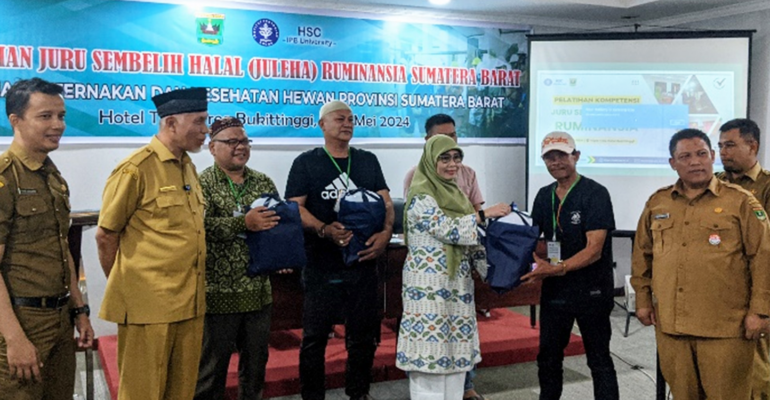Strengthening West Sumatra’s Halal Industry, HSC IPB University in Collaboration with Disnakkeswan Ruminant Juleha Training

Halal Science Center (HSC) IPB University together with the Livestock and Animal Health Service Office (Disnakkeswan) of West Sumatra Province conducted Halal Butchers Training (Juleha) Ruminants Batch 1. This activity is one of the follow-ups after the signing of the memorandum of understanding (MoU) and cooperation between IPB University and the Provincial Government (Pemprov) of West Sumatra.
Batch 1 participants were 40 butchers from slaughterhouses (RPH), slaughterhouses (TPH) and akikah businesses from 14 regencies and cities throughout West Sumatra.
Governor of West Sumatra, H Mahyeldi Ansharullah, SP in his speech said, this training is one of the government’s commitments in ensuring and guaranteeing food products that are marketed have met halal food requirements. This is because the identity of the people of West Sumatra, most of whom are Muslims, is closely related to halal food, especially with the establishment of West Sumatra as a world halal tourist destination.
“The need for halal products today is not only to meet the needs of Muslim-majority communities or countries, but has become the need of the international community. Halal food products are also needed to fulfil the export market. Countries that open halal tourism such as Japan and Korea also require the supply of halal products, of course Indonesia or in this case West Sumatera can take this role,” he said.
In 2022, the West Sumatra Provincial Government asked the Livestock and Animal Health Services to train 1,000 animal slaughterers to fulfil safe, healthy, whole and halal food from animals. Sukarli, SPt, MSi, Chairman of the West Sumatra Livestock and Animal Health Services, reported that until 2023, 330 halal slaughterers had been trained.
“Especially in 2024, training is planned for 170 people so that the target by the end of the year can reach 500 halal butchers. This competency training is also an effort to encourage the acceleration of the halal certification process which must be fulfilled by October 2024 for the types of food, beverage, slaughter products and animal slaughter services,” he explained.
Dr Henny Nuraini as a senior researcher of HSC IPB University and training speaker, expressed her appreciation to the West Sumatera Provincial Government and Disnakkeswan who have committed to implementing halal product processes from upstream to downstream.
“Slaughterhouses as upstream production units that produce meat products and their derivatives must have competent halal butchers. This training is part of the implementation of Law Number 33 of 2014 concerning Halal Product Guarantee. Halal certification is not only intended for halal butchers, but also for the production process in the slaughterhouse,” he said.
“Therefore, batch 1 training participants are expected to become competent butchers and can guarantee the halal slaughtering process of livestock in the West Sumatra region,” he said again.
The training resource team was represented by Dr drh Supratikno, Dr Henny Nuraini, and Agy Wirabudi Pranata, SSi, MSi. The curriculum of this competency training refers to the Indonesian National Work Competency Standard (SKKNI) for Halal Butchers No 196 of 2014.
The practice of slaughtering cattle was carried out at the Bukittinggi abattoir and Padang Panjang abattoir for two days. Participants also received 1 set of personal protective equipment (PPE) and 1 slaughter knife to be used in their respective places of origin. (*/Rz) (IAAS/RUM)


